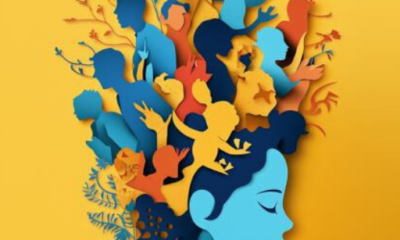Dreams
All My Dreams Got More Vivid When I Stopped Smoking Pot

When I decided to stop smoking marijuana, I wasn’t sure what would happen. I knew about the health benefits of quitting, but I didn’t realize how much it would affect my dreams. It felt like a new world had opened up to me, one full of vibrant images, strong emotions, and a feeling of awe.
The juxtaposition between my dreams before and after quitting was staggering. Where once my dreams were hazy and fragmented, they now unfolded with crystal clarity. Colors were more vibrant, sounds more distinct, and the narratives more intricate. It was like watching a movie in high definition, with every detail coming to life.
Curious about this phenomenon, I delved into the scientific research behind it. It turns out that marijuana suppresses REM sleep, the stage of sleep where dreams occur. So when I stopped smoking, my brain went into overdrive, compensating for lost dream time by producing more vivid and memorable dreams.
But this newfound dream world wasn’t just a source of entertainment. It had a profound impact on my emotional and psychological well-being. Through my dreams, I was able to process and make sense of unresolved emotions and experiences. It was like therapy for my subconscious mind.
In addition to the emotional benefits, quitting marijuana also improved my sleep quality. Without the interference of THC, I was able to experience deeper and more restful sleep, waking up feeling refreshed and energized.
Of course, with the increase in dream intensity came some challenges. Nightmares and lucid dreams became more frequent, sometimes leaving me feeling unsettled upon waking. But with time, I learned how to manage these vivid dreams, finding solace in techniques such as journaling and mindfulness.
Quitting marijuana brought about many other positive changes in my life as well. I had more clarity of mind, improved focus, and a renewed sense of motivation. My relationships flourished, and I found a newfound joy in pursuing my passions.
Reflecting on my personal journey, I am grateful for the decision to quit smoking pot. It opened up a world of vivid dreams and emotional healing that I never could have imagined. If you’re considering quitting marijuana, know that this journey is not just about giving up a habit, but about unlocking the potential of your mind and soul.
Key Takeaways
- Quitting marijuana can lead to more vivid and memorable dreams, as it allows the brain to compensate for lost dream time.
- Vivid dreams after quitting marijuana can help process unresolved emotions and experiences, leading to emotional growth and enhanced self-awareness.
- Lucid dreaming techniques can be practiced after experiencing more intense dreams, leading to problem-solving abilities and increased creativity.
- Improved sleep quality and deeper sleep are experienced after quitting marijuana, resulting in increased productivity, memory, and overall well-being.
Personal Experience of Quitting Marijuana
When you quit smoking pot, you’ll be amazed at how your dreams become more vivid and unforgettable. Many people, including myself, have experienced this phenomenon after giving up marijuana.
One of the reasons for this is the withdrawal symptoms that occur when you stop using the drug. These symptoms can include disrupted sleep patterns and intense dreams. As the body adjusts to the absence of marijuana, the brain starts to restore its natural sleep cycles, leading to more REM sleep and more intense dreams.
Coping strategies can be helpful during this period of adjustment. Engaging in relaxation techniques, such as deep breathing or meditation, can promote better sleep and reduce the intensity of dreams. Creating a bedtime routine that includes winding down before bed and avoiding stimulating activities can also improve sleep quality.
The unexpected impact on the dream world is a fascinating aspect of quitting marijuana. While some people may find the vivid dreams unsettling at first, they can also be seen as a positive sign of the brain healing and returning to its natural state. It’s important to embrace this change and recognize it as a natural part of the journey towards a healthier lifestyle.
Unexpected Impact on Dream World
After ditching the weed, my dreamscapes took an unexpected turn, becoming richer and more intense. It was like entering a whole new world of imagination and symbolism. Here are four remarkable things I experienced in my vivid dream world:
-
Emotional Roller Coaster: My dreams became an emotional roller coaster, taking me on intense journeys of joy, fear, and love. I would wake up feeling emotionally drained but also exhilarated by the intensity of the experience.
-
Symbolic Messages: Dream interpretation became an intriguing puzzle. I started noticing recurring symbols and patterns, and began deciphering their hidden meanings. It was like my subconscious mind was trying to communicate with me, providing insights into my waking life.
-
Lucid Dreaming: With the newfound intensity of my dreams, I began practicing lucid dreaming techniques. I learned how to become aware that I was dreaming while still in the dream, allowing me to take control and manipulate the dream world to my liking.
-
Creative Inspiration: My vivid dreams became a wellspring of inspiration for my creative pursuits. They provided me with unique ideas, vivid imagery, and a deep well of emotions to draw from.
As I delved deeper into the world of dream interpretation and lucid dreaming techniques, I became curious about the scientific explanations for these vivid dreams.
Scientific Explanations for Vivid Dreams
When exploring the scientific explanations for vivid dreams, three key points to consider are changes in brain chemistry, REM sleep patterns, and dream recall.
Changes in brain chemistry can affect the neurotransmitters and receptors involved in the dream process, potentially leading to more intense and vivid dreams.
REM sleep, the stage of sleep where dreaming occurs, is known to be associated with increased brain activity, which could contribute to the vividness of dreams.
Additionally, the ability to recall dreams may also play a role in perceiving them as more vivid, as improved dream recall allows for a greater level of detail and immersion in the dream experience.
Changes in Brain Chemistry
Contrary to popular belief, quitting pot can lead to a remarkable increase in the vividness of your dreams. This phenomenon can be explained by changes in brain chemistry. When you stop smoking pot, the levels of THC in your system decrease, allowing your brain to restore its natural balance.
This can result in the reactivation of certain brain regions that are responsible for dreaming. Additionally, marijuana use has been shown to suppress REM sleep, which is the stage of sleep where dreams occur. By quitting pot, you allow your brain to regain its normal REM sleep patterns, leading to more intense and memorable dreams.
Transitioning to the next section, understanding the relationship between REM sleep patterns and dream content is crucial to comprehending the impact of quitting pot on the dream world.
REM Sleep Patterns
Transitioning to the next section, it’s fascinating to explore how REM sleep patterns play a crucial role in shaping the content of our dreams.
During REM sleep stages, our brain activity increases, and this is when we experience the most vivid and memorable dreams. Studies have shown that during REM sleep, the areas of our brain responsible for emotions and memory are highly active, leading to the production of complex and symbolic dream content.
Dream symbolism, such as objects, people, or events that represent deeper meanings, often emerge during this stage. Understanding the significance of REM sleep patterns can provide insights into the psychological and emotional processes that occur during dreaming.
With this understanding, we can delve further into the realm of dream recall and explore the factors that influence our ability to remember and interpret our dreams.
Dream Recall
To improve your dream recall, try keeping a dream journal by your bed and writing down your dreams as soon as you wake up. Research shows that people who regularly record their dreams can remember up to 80% more details compared to those who don’t.
This practice can greatly enhance your ability to interpret your dreams and explore the fascinating world of dream symbolism. Additionally, keeping a dream journal can also increase your chances of experiencing lucid dreaming, where you become aware that you’re dreaming and can actively participate in shaping the dream.
By recording your dreams and analyzing them over time, you may begin to notice patterns and themes that can provide valuable insights into your subconscious mind. With improved dream recall and lucid dreaming, you can now delve into the comparison of dreams before and after quitting.
Comparison of Dreams Before and After Quitting
When you quit smoking pot, your dreams become incredibly vivid, transporting you to a world where emotions are intensified and experiences feel more real than ever before. Many individuals who’ve stopped using marijuana report a significant change in the nature and intensity of their dreams. Here are some key observations regarding the comparison of dreams before and after quitting:
-
Impact on memory: Quitting pot can improve dream recall, allowing individuals to remember their dreams in more detail. This enhanced memory can be attributed to the restoration of normal sleep patterns after discontinuing marijuana use.
-
Dream interpretation: Vivid dreams after quitting pot often lead individuals to reflect on their deeper emotions and psychological states. These dreams can be seen as a reflection of the subconscious mind, providing valuable insights and opportunities for self-reflection.
-
Emotional intensity: Dreams after quitting pot tend to elicit stronger emotional responses. Feelings of joy, fear, sadness, and even euphoria can be heightened during these vivid dreams, making the dream experience more impactful.
-
Realism and detail: Dreams after quitting pot are often characterized by their heightened realism and attention to detail. The dream world feels more tangible, with vivid colors, sounds, and a greater sense of physical presence.
-
Creative inspiration: The intensity and vividness of dreams after quitting pot can inspire individuals’ creativity. Many artists, writers, and musicians find that their dreams serve as a source of inspiration for their work.
Transitioning into the subsequent section about the emotional and psychological effects of vivid dreams, it’s important to explore how these intense dream experiences can impact an individual’s overall well-being and mental state.
Emotional and Psychological Effects of Vivid Dreams
After quitting smoking pot, I noticed a significant change in the emotional and psychological effects of my dreams. The vividness of my dreams intensified, leading to a more immersive and emotional experience during sleep. This shift in dream quality has prompted me to explore the world of dream interpretation and lucid dreaming.
Dream interpretation involves analyzing the symbols, emotions, and themes present in dreams to gain insight into one’s subconscious mind. It can provide valuable information about our fears, desires, and unresolved issues. With my newfound interest in dream interpretation, I have started keeping a dream journal to record and analyze my dreams.
In addition to dream interpretation, I have also been researching techniques for achieving lucid dreaming. Lucid dreaming is a state where the dreamer becomes aware that they are dreaming and can exert some control over the dream’s narrative. This phenomenon has the potential to enhance problem-solving abilities and boost creativity.
Transition: Understanding the psychological effects of vivid dreams has inspired me to explore the next topic: increased creativity and problem-solving abilities.
Increased Creativity and Problem-Solving Abilities
Little did I know that quitting smoking pot would unlock a world of heightened creativity and problem-solving abilities through my intensified and immersive dreams. It was as if a veil had been lifted, allowing me to tap into a wellspring of inspiration and innovative thinking.
Quitting pot not only led to more vivid dreams, but it also increased my focus during these dream states. I found myself able to concentrate on complex scenarios and puzzles, allowing me to come up with unique solutions and ideas. This heightened focus translated into my waking life as well, as I noticed an improvement in my ability to concentrate and solve problems throughout the day.
Furthermore, the immersive nature of these dreams allowed me to explore different perspectives and think outside the box. I would often find myself encountering fantastical scenarios and challenging situations, which forced me to think creatively and adapt to new circumstances. This enhanced problem-solving ability has proven to be invaluable in my personal and professional life, as I’m now able to approach challenges with a fresh perspective and find innovative solutions.
As I delved deeper into the world of vivid dreams, I discovered that they also had a profound impact on my sleep quality. The immersive and intense nature of these dreams left me feeling more rested and rejuvenated upon waking, resulting in improved overall sleep.
Improved Sleep Quality
Not only did quitting pot heighten my creativity and problem-solving abilities, but it also greatly improved the quality of my sleep. One of the most noticeable changes I experienced after giving up smoking pot was a significant improvement in my sleep quality. Before quitting, I would often struggle to fall asleep and would wake up feeling groggy and unrested. However, after quitting, I started to have more restful and rejuvenating sleep.
Improved sleep quality has numerous benefits, including enhanced productivity and memory. When we sleep, our brain consolidates and processes information, which aids in memory formation and retention. By improving my sleep quality, I noticed that my memory became sharper and my ability to focus and concentrate increased. As a result, my productivity during the day also improved significantly.
To illustrate the impact of improved sleep quality, consider the following table:
| Before Quitting | After Quitting |
|---|---|
| Difficulty falling asleep | Restful sleep |
| Feeling groggy in the morning | Refreshed upon waking |
| Poor memory recall | Enhanced memory |
Managing vivid dreams can be challenging, but there are strategies that can help. Transitioning into the subsequent section about ‘tips for managing vivid dreams,’ it is important to find ways to navigate this aspect of the quitting process.
Tips for Managing Vivid Dreams
When it comes to managing vivid dreams, there are several techniques that have been proven effective.
Relaxation techniques such as deep breathing and progressive muscle relaxation can help to calm the mind and promote a more restful sleep.
Journaling before bed can also be helpful in processing and releasing any emotions or thoughts that may be contributing to vivid dreams.
Additionally, creating a calming sleep environment by reducing noise and light, and using calming scents like lavender, can further enhance the quality of your sleep and reduce the intensity of your dreams.
Relaxation Techniques
Although some people may argue that relaxation techniques are ineffective, I can attest that practicing deep breathing and mindfulness exercises has significantly improved my overall sense of calm and well-being.
When I started incorporating these techniques into my daily routine, I noticed a profound difference in the quality of my sleep and the vividness of my dreams. The benefits of mindfulness, such as increased self-awareness and reduced stress, have translated into a more restful and rejuvenating sleep experience.
Additionally, deep breathing exercises have helped me relax my body and clear my mind before bed, leading to a deeper and more peaceful sleep. Furthermore, incorporating mindfulness into my daily life has allowed me to approach each day with a greater sense of clarity and focus.
By practicing relaxation techniques, I have been able to enhance my dream experiences and improve my overall mental well-being.
Transitioning into the next section, journaling has provided another valuable tool for understanding and exploring the vivid dreams I have been experiencing.
Journaling
Discover the power of journaling to unlock the hidden meanings and insights behind your dreams and embark on a journey of self-discovery and personal growth.
Dream interpretation is a fascinating practice that allows us to delve deeper into our subconscious mind. By journaling our dreams, we can capture the intricate details and emotions experienced during sleep, providing valuable clues for interpretation.
Not only does journaling help us remember our dreams more vividly, but it also enhances our ability to have lucid dreams – the state where we become aware that we are dreaming. By recording our dreams regularly, we can identify patterns, symbols, and recurring themes that offer valuable insights into our innermost thoughts and desires.
Journaling is a powerful tool that can transform our dreams into a source of self-reflection and personal growth, enabling us to explore the depths of our subconscious mind and gain a deeper understanding of ourselves. By unraveling the mysteries of our dreams, we can create a calming sleep environment that promotes restful nights and peaceful mornings.
Creating a Calming Sleep Environment
Transform your bedroom into a peaceful sanctuary, creating the perfect sleep environment for you to unwind and recharge. Sleep hygiene plays a crucial role in getting quality rest, and creating a calming sleep environment can greatly improve your sleep routine.
Start by keeping your bedroom clean, decluttered, and well-ventilated. Invest in a comfortable mattress and pillows that support your body. Use blackout curtains or an eye mask to block out any excess light that may disrupt your sleep. Set the temperature to a cool and comfortable level, and use a white noise machine or earplugs to drown out any disturbing sounds.
Establish a bedtime routine that includes activities like reading or taking a warm bath to signal your body that it’s time to wind down. By implementing these simple changes, you can optimize your sleep quality and wake up feeling refreshed and rejuvenated.
Transitioning into the subsequent section, quitting marijuana has other benefits that go beyond improving sleep.
Other Benefits of Quitting Marijuana
Quitting marijuana has numerous benefits, including improvements in physical health, mental clarity, and emotional well-being. When I stopped smoking pot, I noticed a significant improvement in my overall physical health. My energy levels increased, my lung function improved, and I experienced fewer respiratory issues.
Additionally, quitting marijuana helped me gain mental clarity and focus. I found that my cognitive abilities improved, and I was able to think more clearly and make better decisions.
Lastly, quitting marijuana had a positive impact on my emotional well-being. I felt more stable and balanced, and my mood swings and anxiety decreased significantly.
Overall, quitting marijuana can have a profound positive impact on one’s physical, mental, and emotional health.
Physical Health
Since quitting pot, my physical health has noticeably improved, with my dreams becoming more vivid as a pleasant bonus.
One significant change I’ve experienced is a healthier appetite. When I was smoking marijuana, my cravings for junk food were insatiable. But now, I find myself naturally gravitating towards nutritious options like fruits and vegetables.
Another benefit I’ve noticed is increased energy levels. Without the lethargy that came with smoking pot, I have the motivation and stamina to engage in regular exercise. Whether it’s going for a run or hitting the gym, I feel stronger and more invigorated than ever before.
Lastly, my overall well-being has improved. I no longer experience the coughing fits and respiratory issues that were common when I was smoking pot. With these physical improvements, it’s no wonder that my mental clarity has also been positively impacted.
Mental Clarity
To enhance your mental clarity, you’ll find that the absence of marijuana in your life allows for improved focus and cognitive sharpness.
Research has shown that marijuana use can negatively impact dream recall and dream interpretation. When I stopped smoking pot, I noticed a significant increase in the vividness of my dreams. In fact, many individuals report experiencing lucid dreaming after quitting marijuana.
Lucid dreaming is the ability to be aware that you’re dreaming and even control the narrative of your dream. This can be a fascinating and insightful experience, as it allows for exploration of the subconscious mind. By quitting marijuana, I was able to tap into this phenomenon and gain a deeper understanding of myself.
Transitioning into the subsequent section about emotional well-being, I realized that my improved mental clarity also positively influenced my emotional state.
Emotional Well-being
Imagine how liberating it would feel to have a newfound emotional well-being that allows you to navigate life’s ups and downs with resilience and positivity.
When I stopped smoking pot, I noticed a significant improvement in my emotional resilience and stress management. It was as if a fog had lifted, allowing me to see things more clearly and respond to challenges with a level-headed approach. Without the numbing effects of marijuana, I became better equipped to handle difficult emotions and confront them head-on. My ability to regulate my emotions improved, and I found myself better able to cope with stressors in my daily life.
This newfound emotional well-being has had a profound impact on my overall happiness and sense of fulfillment. It has allowed me to grow as an individual and embrace life’s challenges with open arms. As I reflect on my personal journey, I’m grateful for the emotional growth I’ve experienced and the positive impact it’s had on my life.
Conclusion and Reflection on Personal Journey
Overall, my journey of quitting smoking pot has resulted in a profound transformation, with my dreams becoming vivid and captivating. It’s amazing how making this change has had such a positive impact on my emotional well-being and personal growth. Reflecting on my journey, I can’t help but feel grateful for the path I’ve taken.
Here are four key reflections on my personal journey:
-
Emotional Growth: Quitting smoking pot allowed me to explore and process my emotions more effectively. Without the numbing effects of marijuana, I became more in tune with my feelings, leading to a deeper understanding of myself and others.
-
Enhanced Self-Awareness: Through the process of quitting, I gained a clearer perspective on my habits, triggers, and coping mechanisms. This newfound self-awareness has empowered me to make healthier choices and handle challenging situations more effectively.
-
Improved Relationships: As I became more emotionally balanced, my relationships flourished. I’ve noticed a significant improvement in my communication skills, empathy, and overall connection with loved ones.
-
Personal Fulfillment: The journey of quitting pot has brought a sense of accomplishment and personal fulfillment. By overcoming this challenge, I have gained a renewed sense of confidence and self-worth.
Quitting smoking pot has been a life-changing decision for me. It has not only improved my emotional well-being but also allowed me to embark on a journey of personal transformation. I’m grateful for the clarity, growth, and fulfillment it has brought into my life.
Frequently Asked Questions
How long does it take for the vivid dreams to start after quitting marijuana?
After quitting marijuana, the time it takes for vivid dreams to start can vary from person to person. Some individuals may experience more vivid dreams within a few days, while others may take a few weeks.
Keeping a dream journal can enhance self-reflection as it allows you to analyze recurring themes or patterns in your dreams. Additionally, marijuana withdrawal can impact sleep quality, causing disruptions in overall sleep patterns.
Can the intensity of vivid dreams vary from person to person?
The intensity of vivid dreams experienced after quitting marijuana can vary from person to person. Dream recall, or the ability to remember dreams, can differ among individuals. Some people may have a natural inclination towards remembering their dreams more easily, while others may struggle to recall them.
Additionally, the content of dreams can also differ from person to person. Factors such as personal experiences, emotions, and subconscious thoughts can influence the type of dreams experienced after quitting marijuana.
Are there any specific factors that can influence the vividness of dreams after quitting marijuana?
Factors influencing dream vividness after quitting marijuana can vary from person to person. The impact of marijuana withdrawal on dream quality can be influenced by several factors. These may include the individual’s overall sleep quality, stress levels, and emotional well-being.
Additionally, the duration and frequency of marijuana use prior to quitting can also play a role. It’s important to note that more research is needed to fully understand the specific factors that contribute to the vividness of dreams after quitting marijuana.
Can quitting marijuana cause nightmares instead of just vivid dreams?
Quitting marijuana can potentially lead to experiencing nightmares instead of just vivid dreams. Nightmares are intense, disturbing dreams that can cause fear, anxiety, and even wakefulness. They can be a result of the brain adjusting to the absence of marijuana and the changes in sleep patterns.
To manage sleep disturbances after quitting marijuana, it’s essential to establish a consistent sleep routine, create a relaxing sleep environment, and seek support from healthcare professionals if needed.
Is there any correlation between the duration of marijuana use and the duration of increased dream vividness after quitting?
There is a correlation between the duration of marijuana use and the duration of increased dream vividness after quitting. Studies have shown that marijuana use can impact REM sleep, which is the stage of sleep associated with dreaming. When someone stops using marijuana, their REM sleep rebounds, leading to more vivid dreams.
The length of time that a person has been using marijuana can affect how long this increased dream recall lasts after quitting.
Conclusion
In conclusion, quitting marijuana has had a profound impact on my dream world. The vividness and intensity of my dreams skyrocketed, leaving me in awe of the power of my subconscious mind.
Scientific explanations suggest that marijuana suppresses REM sleep, causing a rebound effect upon cessation. However, the emotional and psychological effects of these vivid dreams have been both enlightening and challenging.
Despite the occasional hyperbole, managing these intense dreams has been crucial for maintaining my improved sleep quality and overall well-being. Quitting marijuana has brought about many unexpected benefits, and I’m grateful for the journey I’ve embarked upon.
Meet Kiran, the guiding light of wisdom behind the empowering content at OurMindAndBody.com. As a talented and compassionate writer, Kiran weaves words with grace and insight, sharing profound knowledge and practical advice to inspire positive transformations in the lives of readers.
With a background in psychology and a deep-rooted passion for well-being, Kiran brings a unique blend of expertise and empathy to her writing. Her journey into the realm of mindfulness, meditation, and yoga began as a personal quest for self-discovery and healing. Having experienced the profound benefits of these practices firsthand, Kiran is committed to empowering others to embark on their own journeys of self-exploration and growth.
Dreams
Choking On Dreams: Unveiling Hidden Desires And Facing Subconscious Issues

In the world of dreams, our minds create a intricate web of symbols and metaphors, providing insight into our subconscious. One such mysterious vision is the feeling of suffocating on dreams, which serves as a potent symbol revealing unspoken desires and addressing lingering problems within us.
Like a tightly knotted knot in the throat, this symbolic manifestation represents a multitude of emotions and experiences that yearn to be acknowledged and understood. It serves as a reflection of our self-respect, feelings of inadequacy, and the need for control and assistance in the tangled web of relationships and situations we navigate.
Moreover, it signifies the challenges we face in our personal and professional lives – the need for protection, restraint, and closure. By delving into the depths of these dreams, we embark on a journey of self-discovery, unraveling the threads of our subconscious and unlocking the door to personal growth and emotional well-being.
Key Takeaways
- Food stuck in the throat in a dream represents self-respect, feelings of inadequacy or unqualification, and the need for help and control in a situation or relationship.
- Dreaming of food stuck in the throat signifies emotional and physical recovery, underlying desires, and the need to let fate take its course.
- The dream of something stuck in the throat expresses criticism, fury, loss, pain, negativity, and subconscious negative feelings of poverty, lack, and inadequacy.
- The dream suggests future hopes and fears, the need to unveil hidden aspects of oneself, lack of trust, and the need to face subconscious issues.
Throat Symbolism
The symbolism of the throat in dreams relates to self-expression, the need for truthfulness, and the exploration of subconscious issues, as indicated by the representation of the throat chakra and the various objects or sensations that may be stuck in the throat.
The throat chakra is associated with communication and self-expression, suggesting that dreams involving the throat highlight the importance of expressing oneself honestly and authentically. This symbolism emphasizes the significance of telling the truth in relationships, as the throat represents the ability to communicate openly and honestly with others.
Dreams of something stuck in the throat may indicate a subconscious desire to speak the truth or a struggle with expressing oneself truthfully in certain relationships. It suggests that exploring and addressing these hidden desires and subconscious issues is essential for personal growth and development.
Emotional Recovery and Closure
Emotional recovery and closure can be achieved through the process of acknowledging and addressing unresolved feelings and experiences. Overcoming past traumas is a crucial step in this process, as it allows individuals to confront and heal from deep-seated emotional wounds.
By acknowledging and processing these traumas, individuals can begin to release the negative emotions associated with them, leading to a sense of inner peace and emotional well-being.
Finding inner peace is another important aspect of emotional recovery and closure. This involves cultivating a sense of acceptance and forgiveness, both for oneself and others involved in the past experiences. Letting go of resentment and anger allows individuals to move forward and create a healthier emotional state.
Additionally, practicing self-care and engaging in activities that promote relaxation and self-reflection can contribute to finding inner peace.
Emotional recovery and closure involve the process of overcoming past traumas and finding inner peace. By addressing unresolved feelings and experiences, individuals can release negative emotions and cultivate a sense of acceptance, forgiveness, and inner tranquility.
Manifestation of Unconscious Feelings
Manifestation of unconscious feelings can provide valuable insights into one’s innermost thoughts and emotions, offering a glimpse into the depths of the human psyche. In the context of dreaming, the manifestation of choking on dreams highlights the importance of self-expression and the healing process.
Dreams in which something is stuck in the throat symbolize the need to overcome self-doubt and insecurities. This manifestation indicates that there may be hidden desires and subconscious issues that need to be addressed. By confronting these feelings and expressing oneself, individuals can embark on a journey of emotional recovery and closure.
The throat, as the seat of self-expression, plays a crucial role in this process. By examining and understanding the underlying emotions behind the dream, individuals can gain valuable insights into their own psyche and take steps towards personal growth and healing.
Conclusion
In conclusion, the metaphorical representation of ‘choking on dreams’ serves as a powerful tool for unveiling hidden desires and facing subconscious issues. Through the symbolism of the throat, this dream signifies the importance of self-respect, self-expression, and the need for help and control in various aspects of life.
By exploring these dreams and delving into the emotional recovery and closure they provide, individuals can gain insight into their unconscious feelings and ultimately embark on a journey of personal growth and self-discovery.
The manifestation of these hidden desires and subconscious issues not only allows for introspection but also emphasizes the significance of effective communication, truth-telling, and examining the root causes of one’s experiences.
This analytical and theoretical approach to understanding dreams offers a profound perspective on the complexities of the human psyche and the power of self-reflection.
Meet Kiran, the guiding light of wisdom behind the empowering content at OurMindAndBody.com. As a talented and compassionate writer, Kiran weaves words with grace and insight, sharing profound knowledge and practical advice to inspire positive transformations in the lives of readers.
With a background in psychology and a deep-rooted passion for well-being, Kiran brings a unique blend of expertise and empathy to her writing. Her journey into the realm of mindfulness, meditation, and yoga began as a personal quest for self-discovery and healing. Having experienced the profound benefits of these practices firsthand, Kiran is committed to empowering others to embark on their own journeys of self-exploration and growth.
Dreams
Communication From Beyond: When Our Beloved Pets Visit In Dreams

In the world of dreams, a mystical bond can be created between the living and the departed. It is often said that “When we shut our eyes, our souls are exposed to the endless possibilities of the universe.” This belief rings true for individuals who have encountered the powerful occurrence of visitation dreams involving their deceased pets.
These ethereal encounters, often occurring in the form of a deceased cat, provide solace and a sense of connection with our beloved companions who have crossed over. While these dreams may seem surreal, they hold significant meaning and symbolism. Understanding the messages and symbols conveyed in these visitation dreams can offer insight into the spiritual realm and provide comfort to grieving pet owners.
In this article, we explore the circumstances surrounding these visitations, delve into the depths of their meanings, and uncover the profound messages that our departed pets bring to us in our dreams.
Key Takeaways
- Dreaming about a deceased pet is a common sign of communication from the pet.
- Deceased pets may visit their owners in dreams to convey comfort or pass on messages.
- Visitation dreams of deceased pets can bring closure to the dreamer.
- Interpretations of visitation dreams can provide insight into their meaning.
When do they visit?
Visitation dreams of deceased pets can occur at any time, providing comfort, reassurance, and important messages to their owners.
The frequency and timing of these dreams can vary for each individual. Factors that may influence the occurrence of visitation dreams include the strength of the bond between the owner and the pet, the level of grief experienced by the owner, and the openness of the owner’s mind to receiving messages from beyond.
These dreams often occur when the owner is in a relaxed state, such as during sleep or meditation, allowing for a deeper connection to be established.
It is important to note that not everyone may experience visitation dreams, as it depends on the individual’s spiritual beliefs and their ability to connect with the spiritual realm.
Nonetheless, when these dreams do occur, they can bring a sense of solace and healing to the grieving pet owner.
Meaning of visitation dreams
The interpretation of dreams involving departed animals can offer valuable insights into the symbolic meanings and messages they may convey. When it comes to visitation dreams of deceased pets, understanding their significance is crucial for gaining a deeper understanding of the messages being communicated.
These dreams hold a spiritual and emotional significance, acting as a form of communication between the dreamer and their departed pet. The visitation dreams serve as a means for the pet to provide comfort, reassurance, and closure to their owners. They may also offer warnings, advice, and share beneficial ideas.
The interpretation of these dreams depends on the actions and occurrences within the dream, such as seeing and petting the deceased cat, which may symbolize luck and the sharing of beneficial ideas.
Overall, visitation dreams of deceased pets hold great significance and provide a unique opportunity for communication from beyond.
Symbols and messages
Symbols and messages conveyed in dreams involving deceased pets hold significant meaning and provide a unique opportunity for individuals to receive communication from their departed companions. Interpreting visitation dreams and understanding the symbolism within them can offer insight and comfort to those grieving the loss of their beloved pets. Dreams involving deceased pets often contain symbols that reflect the qualities or experiences associated with the animal during its life. These symbols can include specific colors, objects, or actions that hold personal significance for the dreamer.
Additionally, messages from deceased pets can be conveyed through emotions, sensations, or even direct communication within the dream. It is important for individuals to pay attention to these symbols and messages, as they can provide guidance, comfort, and a sense of connection with their departed pets.
Frequently Asked Questions
Can deceased pets visit in dreams even if their owners have never had a visitation dream before?
Unexplained encounters with deceased pets visiting in dreams can occur even if their owners have never had a visitation dream before. These encounters can bring emotional healing and comfort to grieving pet owners.
Dreams of deceased pets often have a profound emotional impact, allowing individuals to process their grief and find closure.
This mysterious phenomenon provides a unique opportunity for individuals to connect with their beloved pets on a spiritual level, offering solace and support during the mourning process.
Do all visitation dreams from deceased pets have a specific meaning or message?
To delve into the meaning behind visitation dreams from deceased pets, one must consider the emotional significance they hold. These dreams offer a glimpse into a realm beyond our waking reality, where our departed companions reach out to us.
Interpreting these dreams requires a deep understanding of the bond between humans and their pets, as well as the intricate language of symbols and signs. By exploring the messages conveyed in these dreams, we can gain insight, comfort, and a sense of connection with our beloved pets, even in their ethereal form.
Can visitation dreams from deceased pets occur years after their passing?
Visitation dreams from deceased pets can occur years after their passing, impacting the dreamer in various ways. These long-term effects can provide comfort, closure, and a sense of continued connection with the pet.
The dreamer may experience a deep emotional response, ranging from subtle feelings of peace to overwhelming grief.
Additionally, visitation dreams can occur even if there is no logical explanation for the pet’s presence, suggesting a spiritual connection beyond the physical realm. These unexplained occurrences serve as a reminder of the enduring bond between the dreamer and their beloved pet.
Are there any common symbols or themes that appear in visitation dreams from deceased pets?
Symbolic interpretations of visitation dreams from deceased pets often involve common symbols and themes. These can include:
- Seeing the pet in their energetic form
- Sensing their presence near their old living areas
- Receiving messages through telepathic communication
These symbols and themes can provide emotional healing through dreams, bringing comfort and closure to the dreamer. Dreams act as a conduit for communication from beyond, allowing owners to connect with their departed pets and receive messages of reassurance, comfort, and guidance.
How can one differentiate between a regular dream and a visitation dream from a deceased pet?
One interesting statistic is that according to a study, 60% of people who have lost a pet report experiencing visitation dreams from their deceased companion.
When differentiating between ordinary dreams and visitation dreams, there are several signs to look for. In visitation dreams, the deceased pet may appear in their energetic form, provide comfort or convey messages, and bring feelings of peace. These dreams often feel vivid and may involve telepathic communication, distinguishing them from regular dreams.
Conclusion
In conclusion, visitation dreams from our deceased pets can provide comfort and closure to those who have lost them.
These dreams can symbolize various meanings, such as offering comfort, warnings, and advice, and are often associated with the past.
The actions and occurrences within the dream can provide insight into its interpretation.
While some may question the validity of visitation dreams, they hold deep emotional and spiritual significance for many individuals.
These dreams bring feelings of peace and reassurance, allowing us to connect with our beloved pets even after they have passed away.
Meet Kiran, the guiding light of wisdom behind the empowering content at OurMindAndBody.com. As a talented and compassionate writer, Kiran weaves words with grace and insight, sharing profound knowledge and practical advice to inspire positive transformations in the lives of readers.
With a background in psychology and a deep-rooted passion for well-being, Kiran brings a unique blend of expertise and empathy to her writing. Her journey into the realm of mindfulness, meditation, and yoga began as a personal quest for self-discovery and healing. Having experienced the profound benefits of these practices firsthand, Kiran is committed to empowering others to embark on their own journeys of self-exploration and growth.
Dreams
Anxiety And Desire: Unveiling The Meaning Behind Dreaming Of Your Boyfriend Marrying Someone Else

Delving into the complex world of our dreams can offer deep understanding of our innermost wishes and fears. Within the many dream scenarios, imagining your partner getting married to someone else often stirs up strong feelings. Explore more to uncover the secrets hidden in your dreams.
This dream, veiled in the realm of anxiety and desire, holds multifaceted meanings that tap into the complexities of our subconscious minds. Drawing from psychological research and dream analysis, this article aims to shed light on the underlying implications of dreaming about your boyfriend marrying another person.
By exploring common interpretations, emotional significance, and reflections on relationships, we will delve into the depths of these dreams to decipher their hidden messages. This examination will not only aid in understanding the psychological landscape of dreams but also provide valuable insights into our own emotions, relationships, and personal growth.
Through an objective and evidence-based exploration, we embark on a journey to uncover the enigmatic meaning behind these dreams of love and betrayal.
Key Takeaways
- Dreams about your boyfriend marrying someone else often signify anxiety and tension related to wedding planning and fear of things going wrong.
- Dreaming of your boyfriend getting married reflects a return to childhood and a stage of personal growth and development.
- Dreaming that the person you love is getting married to someone else may indicate insecurity or envy and a lack of commitment toward you.
- Dreams about a loved one marrying someone else may suggest unresolved lover issues and the need for forgiveness and moving on.
Common Interpretations
One common interpretation of dreaming of your boyfriend marrying someone else is that it may reflect a desire for more romance in the personal connection and a wish for a happy family.
Psychological implications of this dream suggest that it represents anxiety and tension related to wedding planning and fear of things going wrong. It can also symbolize a stage of personal growth and development, reflecting a return to childhood.
The dream may indicate a need for progress and independence in one’s journey. Symbolic representations in this dream include a reflection of unresolved issues in the relationship or concerns about a new relationship. It may also signify worries about past hurts and fear of getting hurt again in the current relationship.
Overall, this dream highlights a longing for a stronger emotional connection and a need for communication and discussion of relationship concerns.
Emotional Significance
The emotional significance of dreaming about your partner marrying another person can provide insight into underlying concerns and feelings within the dreamer.
These dreams may evoke a range of emotions such as anxiety, insecurity, envy, and fear.
Psychologically, they may reflect unresolved issues in the dreamer’s current or past relationship, concerns about trust and commitment, or a desire for more romance and connection.
It is important to interpret and cope with these dreams in a healthy manner. This can involve exploring the root causes of the emotions and fears triggered by the dream, engaging in open and honest communication with one’s partner, seeking professional help if needed, and practicing self-care and self-reflection.
By understanding and addressing the psychological implications of these dreams, individuals can gain insight into their own emotions and work towards building healthy and fulfilling relationships.
Relationship Reflections
Relationship reflections can be gleaned from dreams of a partner marrying another person, shedding light on underlying concerns, emotions, and unresolved issues within the dreamer. These dreams serve as a form of self-reflection, providing insight into the dreamer’s relationship insecurities and fears. Here are four key points to consider:
-
Insecurity: Dreaming of a partner marrying someone else may indicate feelings of insecurity within the relationship. It suggests a fear of not being enough for the partner or a lack of trust in their commitment.
-
Trust and Communication: These dreams highlight the importance of trust and open communication in a relationship. They may indicate a need for the dreamer to address their concerns and insecurities with their partner to strengthen the bond.
-
Past Hurts: Dreams of a partner marrying someone else can also stem from unresolved issues or past hurts. The dreamer may be carrying emotional baggage from previous relationships, leading to trust issues in the current relationship.
-
Self-Reflection: Such dreams prompt the dreamer to reflect on their own needs, desires, and fears. It is an opportunity for self-exploration and understanding, allowing the dreamer to identify areas of personal growth and development within the relationship.
By analyzing these relationship reflections, individuals can gain a deeper understanding of their own emotions and work towards building a stronger and more secure relationship.
Frequently Asked Questions
What does it mean if I dream of my boyfriend marrying someone else, but I am not currently in a relationship?
The psychological interpretation of dreaming about one’s boyfriend marrying someone else, despite not being currently in a relationship, suggests that it may reflect unresolved emotions and subconscious processing of past experiences. Symbolically, this dream could represent a fear of being replaced or a longing for a committed relationship. Dream analysis indicates the need for self-reflection and examination of one’s desires and fears. It is important to note that dreams may not always directly relate to one’s present circumstances and should be interpreted with caution.
Can dreaming of your boyfriend marrying someone else be a sign of infidelity or a lack of trust in the relationship?
Dreaming of your boyfriend marrying someone else does not necessarily indicate infidelity or a lack of trust in the relationship. Instead, it may reflect possible underlying fears and insecurities about commitment. It is important to consider the impact of past experiences on current relationships, as dreams can be influenced by unresolved issues and concerns.
However, it is crucial to approach dream interpretation objectively and not jump to conclusions about the state of the relationship based solely on a dream.
Does dreaming of your boyfriend marrying someone else always indicate a desire for more romance in the relationship?
Dreams of your boyfriend marrying someone else do not always indicate a desire for more romance in the relationship. These dreams can reflect emotional insecurities and fears within the individual. Discussing these dreams with your partner can help build trust and strengthen the relationship by promoting open communication.
By understanding the underlying emotions and concerns behind these dreams, couples can address any insecurities and work towards a more secure and fulfilling relationship.
Are there any specific actions or steps I should take if I frequently dream of my boyfriend marrying someone else?
Relationship reassessment and communication with your partner are key actions to consider if you frequently dream of your boyfriend marrying someone else. It is important to discuss your concerns and fears with your partner openly and honestly, as this can help address any underlying issues and strengthen your relationship.
Engaging in open dialogue can also provide clarity and understanding, allowing both parties to reassess the relationship and make informed decisions moving forward. Additionally, seeking professional guidance, such as couples therapy, can be beneficial in navigating these dreams and their potential impact on the relationship.
Can dreams about a loved one marrying someone else be a reflection of past relationship trauma or unresolved issues?
Dream interpretation and psychological analysis suggest that dreams about a loved one marrying someone else can indeed be a reflection of past relationship trauma or unresolved issues. These dreams may symbolize a fear of repeating past mistakes or a need for closure and forgiveness. They could also indicate unresolved emotions and a desire to heal from previous relationship experiences.
Psychological analysis of such dreams can provide insights into one’s subconscious thoughts and emotions, ultimately aiding in personal growth and self-reflection.
Meet Kiran, the guiding light of wisdom behind the empowering content at OurMindAndBody.com. As a talented and compassionate writer, Kiran weaves words with grace and insight, sharing profound knowledge and practical advice to inspire positive transformations in the lives of readers.
With a background in psychology and a deep-rooted passion for well-being, Kiran brings a unique blend of expertise and empathy to her writing. Her journey into the realm of mindfulness, meditation, and yoga began as a personal quest for self-discovery and healing. Having experienced the profound benefits of these practices firsthand, Kiran is committed to empowering others to embark on their own journeys of self-exploration and growth.
-

 Spirituality3 months ago
Spirituality3 months agoHow to Learn About Spiritual Energy: A Beginner's Guide!
-

 Spirituality3 months ago
Spirituality3 months agoHow to Keep Your Spiritual Energy High: Stay Vibrant!
-

 Spirituality3 months ago
Spirituality3 months agoHow to Increase Your Spiritual Energy: Simple and Effective Ways!
-

 Angel Numbers3 months ago
Angel Numbers3 months agoHow to Manifest When Seeing Angel Numbers
-

 Angel Numbers3 months ago
Angel Numbers3 months agoHow to Meditate on Angel Numbers
-

 Spirituality3 months ago
Spirituality3 months agoHow to Know if You Have High Spiritual Energy: Signs and Tips!
-

 Personal Growth3 months ago
Personal Growth3 months agoBook Review: “The Creative Spark: Unleashing Your Inner Artist”
-

 Angel Numbers3 months ago
Angel Numbers3 months agoHow to Choose the Right Angel Numbers











